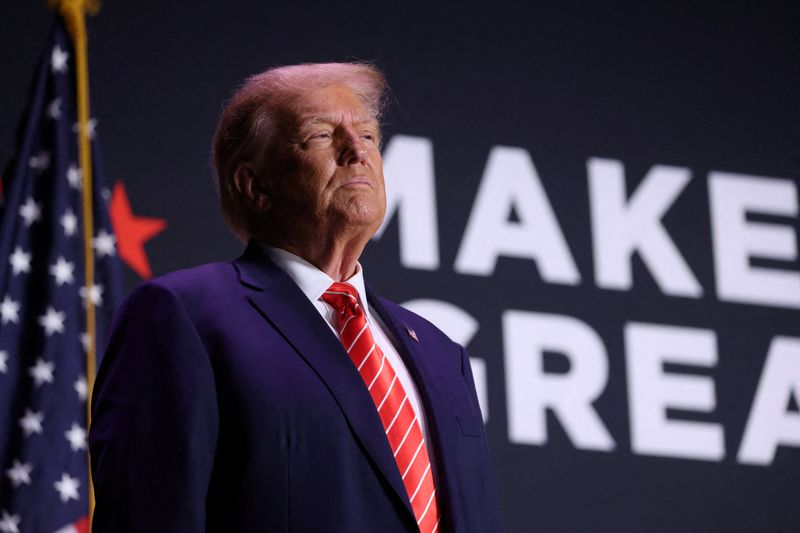By Blake Brittain and Andrew Chung
WASHINGTON (Reuters) -U.S. Supreme Court justices on Wednesday appeared skeptical that a California lawyer can own a federal trademark covering the phrase "Trump Too Small" over the objections of the U.S. Patent and Trademark Office in a legal fight over the interplay between trademarks and constitutional free-speech rights.
The justices heard arguments in the agency's appeal of a lower court's decision that reversed its denial of attorney Steve Elster's trademark application for "Trump Too Small" - an irreverent criticism of former President Donald Trump - to use on T-shirts.
Some of the justices signaled doubt that Elster's denial violated his right to free speech as protected by the U.S. Constitution's First Amendment, as he has claimed.
Conservative Chief Justice John Roberts told Elster's attorney Jonathan Taylor that a win for his client could cause problems for freedom of expression by others.
"Presumably there will be a race to trademark 'Trump Too This, Trump Too That,' whatever. And then, particularly in an area of political expression, that really cuts off a lot of expression that other people might regard as an important infringement on their First Amendment rights," Roberts said.
Liberal Justice Sonia Sotomayor added, "The question is, is this an infringement on speech? And the answer is no."
Elster applied for the trademark in 2018, invoking an exchange between Trump and U.S. Senator Marco Rubio during a debate among candidates for the 2016 Republican presidential nomination. Trump earlier had insulted Rubio as "Little Marco." Rubio retorted that Trump had disproportionately small hands.
"Look at those hands. Are they small hands?" Trump asked at the debate. "If they're small, something else must be small. I guarantee you, there's no problem. I guarantee it."
Elster said that "Trump Too Small" expressed his opinion about "the smallness of Donald Trump's overall approach to governing." Trump was president when the application was made.
Trump, now the frontrunner for the Republican nomination to challenge Democratic President Joe Biden in the 2024 U.S. election, is not personally involved in the case and has not commented on it.
The trademark office rejected Elster's application based on a 1946 federal law that bans the use of a person's name in a trademark without that individual's permission. But a federal appeals court sided with Elster, finding that the government's interest in protecting the privacy and publicity rights of public figures did not supersede Elster's right under the First Amendment to criticize them.
Elster's application remains on hold at the agency pending the Supreme Court's ruling, expected by the end of June.
The Supreme Court in recent years has struck down two trademark laws, citing free speech concerns. It ruled in favor of Asian-American rock band The Slants in 2017 against a ban on trademarks that "disparage," and in favor of artist Erik Brunetti against a prohibition on "immoral" or "scandalous" trademarks in a dispute over his "FUCT" brand in 2019.
Biden's administration has told the Supreme Court that the law now at issue is different because it does not restrict speech based on an applicant's viewpoint and is only meant to prevent a person's name from "being exploited for another's commercial gain."
Some justices challenged Taylor to explain how Elster's speech was being burdened by the trademark denial.
"Just what are the viewpoint-based concerns and are they real?" liberal Justice Ketanji Brown Jackson asked.

Conservative Justice Neil Gorsuch emphasized that there is a long tradition since the nation's founding of limiting trademarks on the names of living people.
"At the end of the day, it's pretty hard to argue that a tradition that's been around for a long, long time ... is inconsistent with the First Amendment," Gorsuch said.